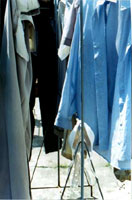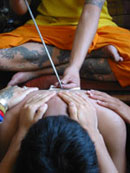Laundry Time
08 October 2001 Issue Laundry Time I never was a fan of doing laundry. The most interesting part aspect of laundry day for me is how each country has its own version of how to correctly get the washing done. In America I tried to keep laundry day as painless as possible. I headed off to a Laundromat, overloaded the machine without much sorting and hoped that time would pass quickly.
In Switzerland it took my landlord over two hours to explain the rules and regulations of the communal laundry room. Each apartment is assigned a specific day to do their wash and the room must be left in meticulous condition when everyone’s finished. Swiss also precisely sort every piece of clothing by correct washing temperature and colour. Laundry day became more serious and challenging for me.
Then I moved to Thailand. It took me a while to figure it out, but it turns out that clothes are sorted based on the part of the body that they cover. Separating colours and paying attention to washing temperatures further complicates the matter. Thailand wins the ultimate laundry challenge competition in my book.
paying attention to washing temperatures further complicates the matter. Thailand wins the ultimate laundry challenge competition in my book.
As Thais consider their heads the highest and holiest part of their body and their feet the lowest (see back issues: From Head To Toe, 25 Sep 2000, http://www.bangkokpost.com/kat/archives/250900a.html), every piece of clothing carries its appropriate hierarchy with it on the journey into the washing machine and on to the clothesline. Every individual or family has their own version of laundry day but there are some general guidelines.
In general there are three hierarchically-based categories of wash loads: 1) bras, underwear and socks 2) trousers and shirts and 3) anything worn on the head. Some people will also separate trousers from shirts and/or male and female items before washing.
When it comes time to hang the clothes out to dry the laundry ranking rules still apply. A low ranked item of clothing is always hung below a higher ranked one, meaning a sock or bra would never be placed above or even next to a shirt or a hat. Laundry ranking is also displayed in the way some Thai women take off their skirts; they usually do not pull them over their heads.
Another laundry issue can best be called ‘who is willing to wash what’. A man would definitely not want to wash women’s undergarments and would be offended if asked to do so. Women would prefer not to wash men’s underwear not from within the family, but are more flexible in laundry matters. Some people will refuse to wash undergarments or socks period.
Laundry time in Thailand may sound complicated but there are reasons behind it; taboos about sexual contact between men and women, the expression of modesty, and superstition all play a role in the treatment of undergarments.
A prominent belief is that if a man’s Buddhist amulet passes under women’s undergarments, its protective powers will be rendered ineffective. This means most men would never walk under a clothesline with undergarments on it and it is also the reason why a woman would never step over a man who was lying down.
Modesty means that a woman will try not to hang her undergarments out in plain view unless it is necessary. Rural Thailand is much more modest than Bangkok on this point and also generally has much more space to use. Outside of the cities women’s undergarments can be seen tucked in a remote backyard corner. Sometimes they are also covered over with a cloth so that they truly cannot be viewed by anyone. This increases drying time immensely but is modest indeed.
There is also a law in Thailand that says it is illegal to leave your house without wearing underwear. I am not sure how this law is enforced but my guess is that when it was passed, it was with women’s sarongs in mind. A sarong is a skirt sewn in a tube shape and held up in the skirt position by clever tight tucking. Wearing underwear is definitely a good plan for when something goes wrong, which is pretty much inevitable.
I once visited a women’s rights organization in western Thailand. Their office doubled as a home for many of the members. All of their undergarments were hung up to dry in plain view at the entrance as part of their political statement. This stood out like a sore thumb even to me and continues to cause quite a stir in the village.
If you need wash done, my suggestion is that you separate your socks and undergarments from the rest of your dirty clothing. If you are in rural Thailand and have the chance to wash them yourself, then do so. If not, first ask if the laundry person is willing or not to wash them before handing them over. There is more to laundry than meets the eye in Thailand.
